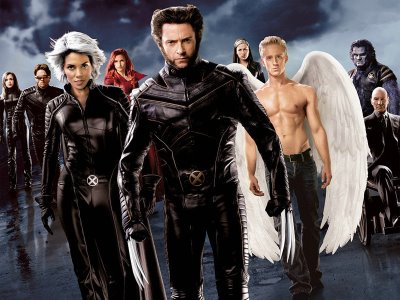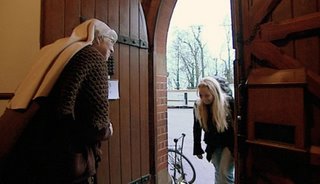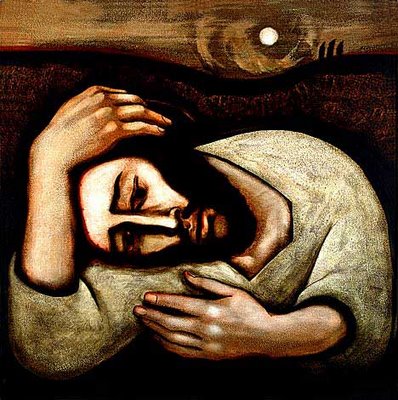
Aside from an excuse to escape for two hours into fantasy violence, my interest in a possibly deeper value in
X-Men 3 was piqued by an interview I saw of Ian McKellen by Jonathan Ross. "It's all about how society deals with people it thinks are different," McKellen said. And then with a slight raise of the eyebrow and a look into the camera reinforced his comment with an ironic self-reference. Most people in the audience clearly knew of his homosexuality and showed they had got the message by laughing knowingly.
As I saw the film McKellen's interpretative key was in my mind. He was right, X-Men 3 really is about diversity and conformity. For those who don't know the basic series plotline it's this: some people are born with so-called 'mutant' genes which give them superhuman powers; society distrusts this hidden social element and wishes to control it; the 'mutant community' splits between moderates who aim for social inclusion and a violent fringe who want to dominate the non-mutant human population.
With the swiftest of glances one can see resonances between the fictional 'mutants' and various real-life 'outsiders' in the history of the West: Jews, women, Catholics/Protestants, blacks, Asians, gays, immigrants - most recently Muslims - and in every age the mentally ill. Moreover, one can trace this particular film's plot-line, the discovery of a 'cure' for the mutant 'X' gene, in various attempts to 'cure' both homosexuality and mental illness by psychotherapy or genetic manipulation; to 'treat' the 'problem' of the Jews through ghettoisation, sterilization or murder; or at the 'softer' end of the argument to tag, impound or deport illegal immigrants. There are plenty of possible allusions one could chase down.
Perhaps one shouldn't expect much more from a comic-based Hollywood fantasy than easy allusion, but the film does also surprisingly hint at part of a Christian response. Admittedly this is heavily overlaid with the usual myth of redemptive violence (in this case the apparent self-sacrifices and resurrections of Wolverine and Xavier which have nothing to do with the stories of Christ and the martyrs and their self-offerings [tip: watch right to the end of the credits for an extra scene]).
Halfway through the film though, at a key juncture, when the 'mutant community' has to decide how to respond to the invention of a 'cure', a meeting takes place in an abandoned church building. It's curious as to why this set is chosen, and why the building is shown in ruins. What's even more fascinating is the name of the church. A shot of a poster advertising the meeting reveals it is 'Holy Trinity'.
For much of Christian history, Christians have lost sight of the Trinity, assuming that Christianity was simply another (better) form of monotheism. Though heresies like
Arianism were rejected (one virtue of the dreaded Da Vinci Code is that people have now at least heard of Nicea!), Christianity has long tended towards a monarchical view of God. The 'Father' is at the top and is pure God, 'Jesus' is a bit lower down the scale obedient to his Father but confusing everyone by being half-man/half God, and the Spirit sort of floats around and is just everywhere in some vague inoffensive way. With such a view of God, a version of society based on hierarchy, order, obedience and conformity is easy to legitimise.
Naturally I overdraw the matter, but any real sense of the Trinity as an inter-penetrative dance of equals has until recently been lost. (It was the Greek Fathers in the fifth century who first used the image of dancing to draw out the fragmentary treatment of the Trinity offered in the New Testament). Consequently any alternative model for a society incorporating diversity has had no real theological justification.
In the past century Christianity's ideology of a monarchical single authority which must be obeyed was taken over into the philosophy of Modernism. With the rise of Modernism's fascist, communist and capitalist children an all-powerful Father figure was supplanted by their own all-powerful father figures: Hitler, Stalin, Mussolini, Pol Pot, Mao, or more nebulously by capital itself.
Ironically then, though some Christians habitually criticize the advent of Post-Modernism, it has precisely been the rise of skepticism toward unique authority figures that has allowed a rediscovery of the Trinity.
God, we are slowly beginning to discover again, is not perhaps a divine dictator who requires our obedience. God is more like a community of difference and equality into which we are invited. Indeed with the Incarnation of the Word as flesh and then the later bodily Ascension of Jesus, God succeeds in incorporating the Creation into the divine dance: humans are 'slaves' to God no longer, we are siblings, children or friends (indeed could we say we are one flesh with God?).
It its own tiny way, X-Men 3 nods towards the Trinity as one possible answer as to how people of difference can coexist. Obviously that needs some serious teasing out in its social practicalities, but it does at least begin to admit the acceptability of a model of diversity-in-unity.
Christians will want to unpack the ramifications of the Trinity through careful study of the way the Persons of the Trinity interrelate and how God's own mutual self-giving might be reflected in our own lives. And though we might feel we are stepping out into new places, St Paul's own treatment of racial, gender and social differences (
Galatians 3:28) ought to remind us that we are really only continuing an earlier project: the attempt to realize Jesus' final prayer (
John 17:22) that we 'might be One' as God the Trinity is, paradoxically, 'One'.
 Victoria, one of the women in the current series, The Convent, takes me to task for suggesting she was not serious about her time with the Sisters and chosen only for 'entertainment value' (alas my words...).
Victoria, one of the women in the current series, The Convent, takes me to task for suggesting she was not serious about her time with the Sisters and chosen only for 'entertainment value' (alas my words...).







